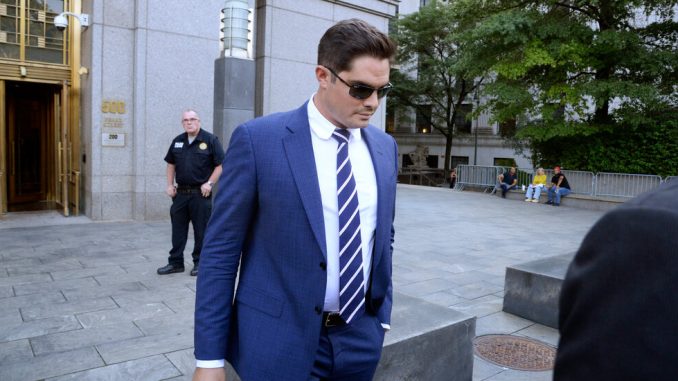
Ryan Salame, a former top executive at the cryptocurrency exchange FTX, pleaded guilty on Thursday to criminal charges linked to the sweeping fraud case against FTX’s founder, Sam Bankman-Fried, a move that raises the pressure on Mr. Bankman-Fried ahead of his trial next month.
In a federal courtroom in downtown Manhattan, Mr. Salame pleaded guilty to a campaign finance law violation and a charge of operating an unlicensed money transmitting business.
Mr. Salame said he had made millions in political contributions at the direction of Mr. Bankman-Fried. The contributions were labeled loans from FTX’s sister company, the crypto hedge fund Alameda Research.
“I understood that the loans would eventually be forgiven, and that I would never have to repay them,” Mr. Salame said. Asked whether he was pleading guilty to the counts, he said, “Yes, Your Honor.”
Mr. Salame (pronounced SALEM), who appeared in court in a blue suit, a striped tie and blue socks designed with orange Bitcoin logos, will pay a $6 million fine and more than $5 million in restitution to FTX, and will forfeit two properties in Lenox, Mass., along with a Porsche automobile. He could be sentenced to up to 10 years in a federal prison.
Mr. Salame, 30, who ran FTX’s subsidiary in the Bahamas and was a prolific donor to Republican politicians, is the fourth executive in Mr. Bankman-Fried’s circle of close advisers to admit to criminal conduct since FTX collapsed in November. Three others — Nishad Singh, Caroline Ellison and Gary Wang — have already pleaded guilty to fraud charges and agreed to cooperate against Mr. Bankman-Fried. A representative for federal prosecutors said Mr. Salame was not cooperating with the investigation.
FTX filed for bankruptcy last year in a stunning collapse that has become a symbol of crypto industry hubris. With the help of Mr. Salame, Mr. Bankman-Fried had turned FTX into a household name, endorsed by celebrities and politicians. Then the company imploded over a few days, and customers lost more than $8 billion in deposits.
Mr. Bankman-Fried, 31, was arrested in December and charged with seven criminal counts, including wire fraud and securities fraud. He is accused of using billions of dollars in FTX’s customer funds to finance lavish real estate purchases, political donations and investments in other companies.
He has pleaded not guilty, and his trial is scheduled to begin on Oct. 3. Last month, Mr. Bankman-Fried’s bail was revoked and he was sent to jail after a judge ruled that he had twice tried to interfere with witnesses in the case.
A spokesman for Mr. Bankman-Fried declined to comment. Jason Linder, a lawyer for Mr. Salame, also declined to comment after Thursday’s hearing.
Damian Williams, the U.S. attorney for the Southern District of New York, said Mr. Salame’s illegal campaign contributions had been part of an unlawful political influence campaign that “helped FTX grow faster and larger by operating outside of the law.”
Mr. Salame also took part in a scheme that enabled FTX to take money from U.S. customers through accounts that Alameda had with a few U.S. banks, according to the charging document. The accounts were opened as trading accounts and were not approved to accept deposits from crypto customers.
For years, Mr. Salame was one of Mr. Bankman-Fried’s top advisers. A native of the Berkshires, Mr. Salame started working at Alameda, which Mr. Bankman-Fried ran in Hong Kong at the time. When Mr. Bankman-Fried moved FTX to the Bahamas, Mr. Salame was the point person who communicated with the local government.
As FTX grew, Mr. Salame became one of crypto’s wealthiest executives and used some of his wealth to buy popular restaurants in the Berkshires. He received $87 million in bonuses and loans from Alameda, according to court records, and was known for his taste for private jets and expensive cars.
Mr. Salame also became active in the Washington political scene, styling himself as a “budding Republican megadonor.” He donated $24 million in the 2022 midterm elections, mostly to Republicans, and started dating Michelle Bond, a crypto lobbyist who made a losing bid for Congress as a Republican from Long Island, N.Y.
The implosion of Mr. Bankman-Fried’s business turned Mr. Salame into a target for federal prosecutors. In April, the F.B.I. searched the Potomac, Md., home he shared with Ms. Bond. Agents seized phones belonging to Mr. Salame and Ms. Bond.
Mr. Salame was also directly implicated in the charges against Mr. Bankman-Fried. In legal documents, prosecutors have claimed that Mr. Bankman-Fried enlisted his executives in a “straw donor” scheme to avoid limits on campaign contributions. They said Mr. Bankman-Fried had recruited the executives as proxies to donate tens of millions of dollars to both parties, effectively on behalf of the company. A revised indictment against Mr. Bankman-Fried identified Mr. Salame’s donations as part of the scheme.
Prosecutors eventually dropped the campaign finance charge against Mr. Bankman-Fried, citing procedural issues with his extradition from the Bahamas. But in a court filing last month, the prosecutors said they would use the campaign finance allegations to support the other charges that Mr. Bankman-Fried faces.
Benjamin Weiser contributed reporting. Jack Begg contributed research.


Be the first to comment